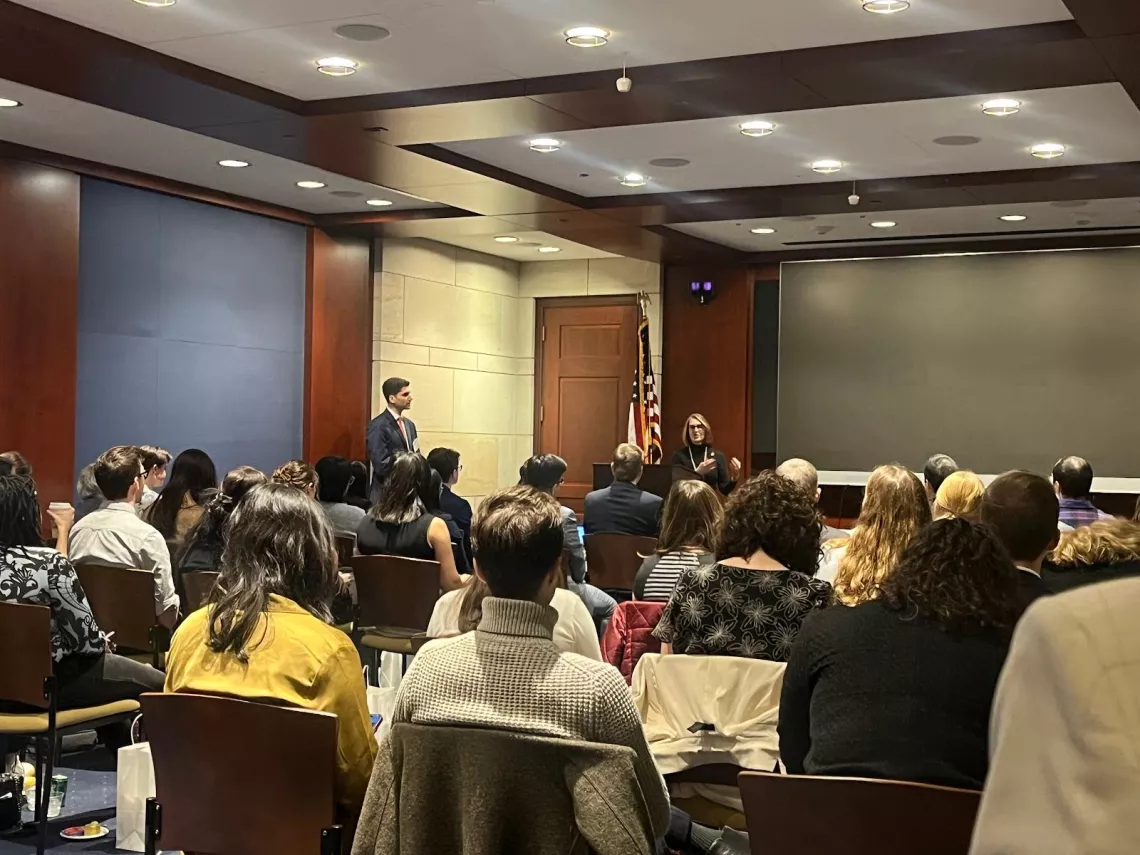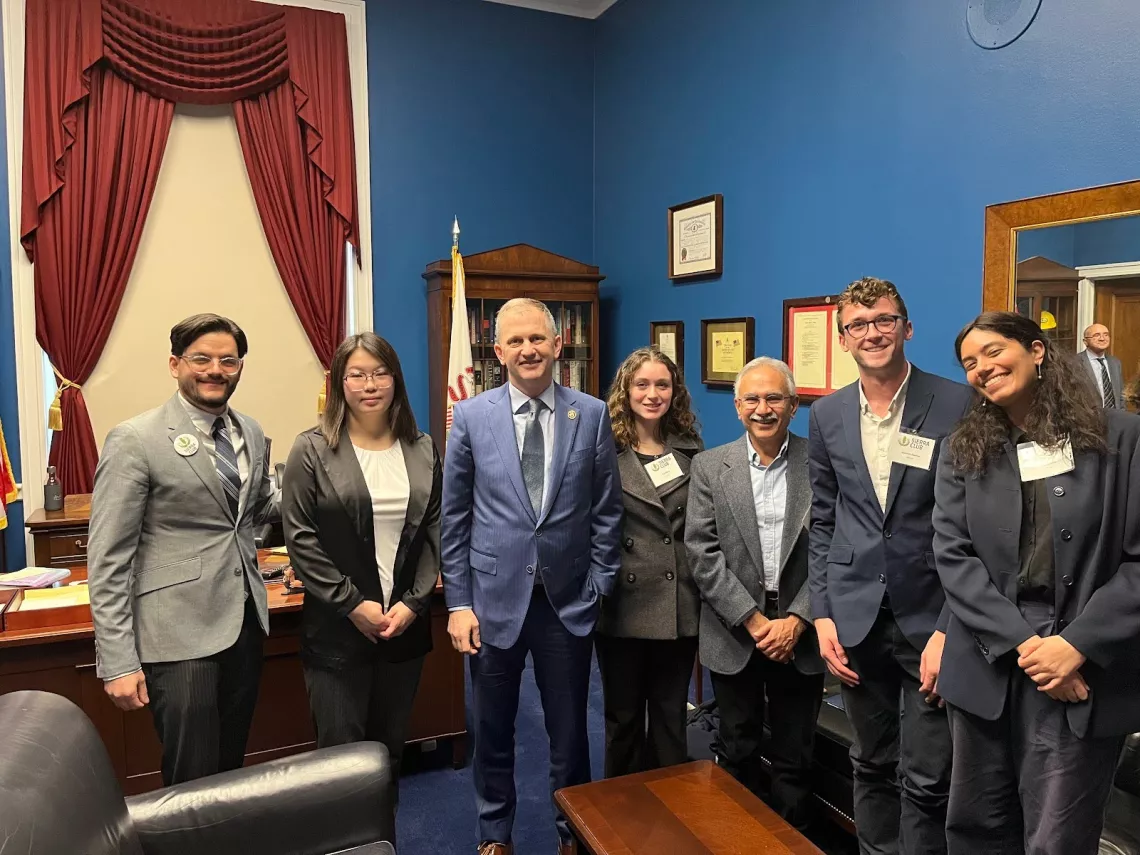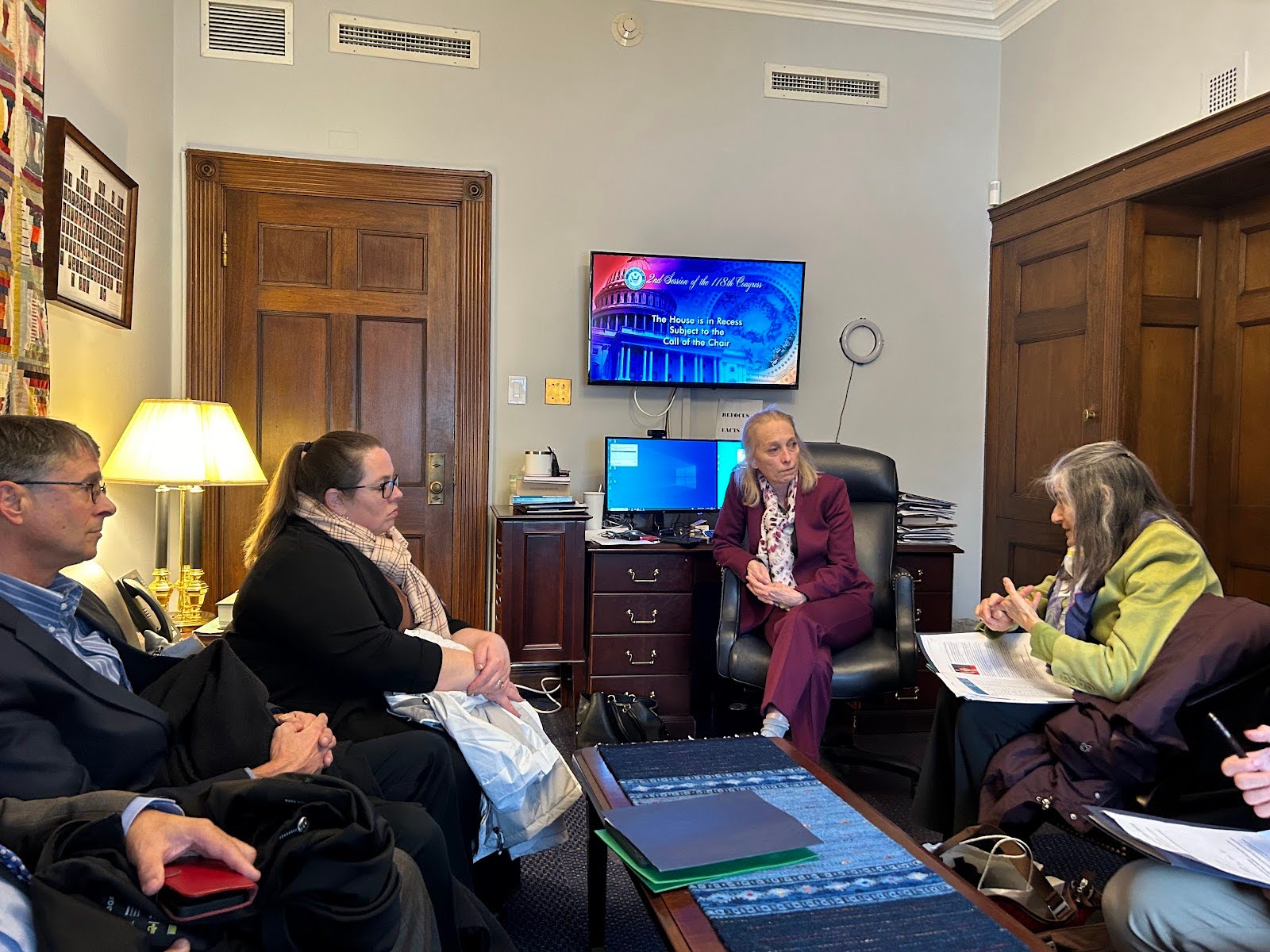In mid January, 30 Sierra Club volunteers and regional organizers traveled to Washington, D.C. to join the Industrial Decarbonization campaign for a two-day lobbying event on a clean and competitive transformation of the industrial sector. Their advocacy was particularly focused on the manufacture of critical materials like steel, aluminum, and cement. Coming from as far away as California, Washington, Utah, Colorado, Michigan, Ohio, Pennsylvania, Indiana, Illinois and Missouri, volunteer leaders played a crucial role in helping to shift the Sierra Club’s federal lobbying strategy for climate-forward trade and clean manufacturing policy into high gear for 2024.
🧵 Follow along from D.C. for our event on industrial sector transformation!
— Sierra Club Live (@SierraClubLive) January 17, 2024
Panelists include @Breakthrough @BGAlliance @Securing_Energy @BPC_Bipartisan @SierraClub & @SierraClubMI.
Plus special remarks from @USRepKCastor @RepDelBene @RepLloydDoggett & @RepRoKhanna. pic.twitter.com/H23nbM4lSZ
Day 1: Lobbying training and panel discussion
On Day 1, volunteers teamed up with Sierra Club staff to learn about industrial decarbonization pathways, policy options, and lobbying best practices. Energy analysts who authored the Sierra Club’s Coming Clean on Industrial Emissions report gave a briefing on the environmental performance of factories in volunteers’ communities, and how to use these findings in their advocacy on Capitol Hill.
Staff and volunteers on the frontlines of industrial pollution discussed the issue and agreed that the Sierra Club’s lobbying efforts must seek affirmative approaches to maintain and expand clean and competitive production of critical materials like steel, cement, and aluminum — which can often feel like a vastly different approach from the Sierra Club’s other energy campaigns.
Come on a #WalkandTalk through the halls of Congress🏛️ with volunteer Dan DiMeo to learn about industrial decarbonization! "We can build clean by buying clean," Dan says about our clean manufacturing future. #BuyClean
— Illinois Sierra Club (@SierraClubIL) January 19, 2024
Learn more⤵️ pic.twitter.com/QkH3u0mzGN
Later that afternoon, Sierra Club hosted a luncheon and panel discussion on Innovating Industry: Policy Solutions for a Clean and Competitive U.S. Industrial Sector. It was a packed event, with Republican and Democratic staffers joining Sierra Club staff and volunteers, and outside organizations.
During the panel discussion, we heard from Reps. Kathy Castor (D-FL), Suzan DelBene (D-WA), and Ro Khanna (D-CA), who highlighted their leadership on industrial decarbonization and complementary trade policies. We also heard from a panel of experts on how clean industrial policy can bring together traditionally opposing groups — Republicans and Democrats, climate champions and national security advocates, and environmental justice communities and organized labor.

Michigan resident & @SierraClubMI volunteer Ebony Elmore shares what it was like growing up in the Tri-Cities area, otherwise known as "Michigan's most toxic zip code" due to industrial pollution.
— Sierra Club Live (@SierraClubLive) January 17, 2024
Read more in the Detroit @MetroTimes: https://t.co/Mu9E24MYdI pic.twitter.com/11g8iTCsI2
Day 2: Let the lobbying begin!
On Day 2, volunteers visited more than 45 House and Senate offices of both parties, and met with 10 Representatives and Senators. We also attended coffees, breakfasts and luncheons with our state’s congressional delegations, and even successfully scored unscheduled meetings with staff. In all, the lobby day resulted in fruitful meetings and opportunities for future collaboration, with Members of Congress committing to introduce industrial decarbonization bills.
In one such meeting, Hoosier (Indiana) Chapter members Ashlyn Devine, philanthropy, and Joab Schultheis, chair, met with Sen. Mike Braun for 25 minutes to talk about how industrial decarbonization can make manufacturing in Indiana more competitive. Additional meetings with staff from Reps. Andre Carson and Don Beyer's offices yielded interesting conversations about how the Sierra Club’s Coming Clean on Industrial Emissions report can inform clean industrial policy.
In another meeting, Laurel Schandelmier, a volunteer with the Sierra Club's Washington State chapter, had the opportunity for a quick meeting with Rep. Pramila Jayapal. She also met with staffers from several other Washington state congressional offices to talk up industrial decarbonization, including Rep. Suzan DelBene and an unscheduled drop-in at Sen. Maria Cantwell's office, finding receptive ears for the message of revitalizing green jobs while taking serious action on climate.
Following her speech at the policy luncheon the previous day, Michigan Chapter volunteer Ebony Elmore reflected on her experience of meeting with her elected officials: "When I had the opportunity to speak during the luncheon, the foundation it set for me to self-advocate and champion for other communities that share the same lived experience as mines was hopeful. It allowed for solution-based conversations among Michigan Chapter staff and volunteers when we met with a staffer from Rep. Hailey Stevens office to discuss the bipartisan Industrial Competitiveness and Clean Innovation Caucus."

From meetings with elected officials to conversations with Congressional staffers, these conversations showcased a clear role for the Sierra Club’s Industrial Decarbonization campaign in helping to boost federal industrial decarbonization efforts in the Inflation Reduction Act and Bipartisan Infrastructure Law, while also writing a new clean manufacturing legislative package.
What’s next for the Sierra Club’s industrial transformation work
In the weeks ahead, volunteers will reconvene virtually with Sierra Club staff to begin forming a grassroots team, which will champion pathways to industrial transformation led by frontline communities, and host informational workshops on climate-forward trade policies that support the manufacturing sector.
We are encouraged by interest on both sides of the aisle for the Sierra Club’s push for the formation of a bipartisan Industrial Competitiveness and Clean Innovation Caucus, which will focus on legislation on clean manufacturing breakthroughs and deployment of upgrades that reduce pollution immediately.
If you’re interested in joining a grassroots team pushing for the transformation of the industrial sector in your community, or if you want more information on the Sierra Club’s bipartisan Industrial Competitiveness and Clean Innovation Caucus, please email Deputy Legislative Director Harry Manin at harry.manin@sierraclub.org.
